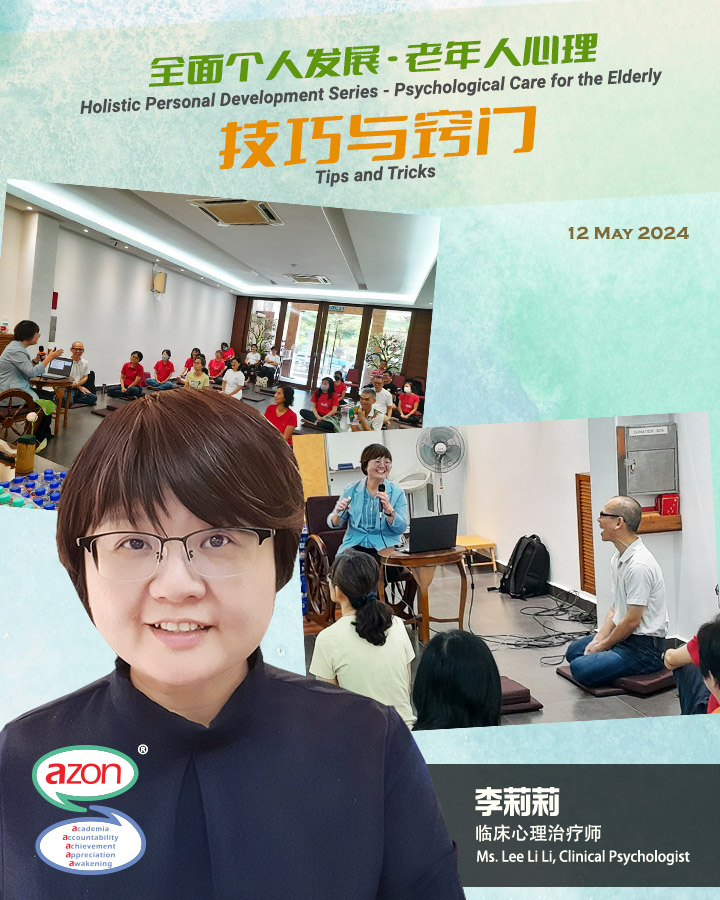
Topic: Holistic Personal Development Series - Psychological Care for the Elderly: Tips and Tricks
Speaker: Ms Lee Li Li (Clinical Psychologist)
Date: 12 May 2024(Sunday)
Psychological care for the elderly is a crucial aspect of holistic personal development, addressing the emotional, cognitive, and mental health needs of older adults. By understanding the unique psychological needs of the elderly, we can foster environments that promote mental health, resilience, and happiness during the later years of life.
A. Effect of Medication on Mental Health
C. Elderly Sleeping Disorders
D. Elderly Abuse and Neglect
E. Self-Care for Caregivers
Speaker: Ms Lee Li Li (Clinical Psychologist)
Date: 12 May 2024(Sunday)
Psychological care for the elderly is a crucial aspect of holistic personal development, addressing the emotional, cognitive, and mental health needs of older adults. By understanding the unique psychological needs of the elderly, we can foster environments that promote mental health, resilience, and happiness during the later years of life.
A. Effect of Medication on Mental Health
- Depression Triggers:
Taking medication can sometimes negatively influence a person’s mental state, serving as a reminder of illness and dependency, and potentially causing depression or anxiety.
- Medication Management in the Elderly:
Complex medication routines in elderly individuals often lead to overuse, especially of sleeping pills, as they seek immediate relief from symptoms, which can cause dependency and other health issues.
- Symptoms:
- Core Symptoms:
Persistent low mood and loss of interest in activities for at least 2 weeks, often triggered by life changes such as retirement, loss of social roles, and health issues. - Somatic Symptoms:
Physical complaints without a clear medical cause, reflecting psychological distress.
- Core Symptoms:
- Coping Strategies:
- Encouraging socialization: encourage activities they enjoy and maintain social connections.
C. Elderly Sleeping Disorders
- Sleeping disorders often lead to the overuse of sleeping pills among the elderly.
- Non-medication Coping Strategies:
- Lifestyle Adjustments: Promote regular physical activity, consistent sleep schedules, and exposure to sunlight.
- Dietary Changes: Encourage consumption of melatonin-boosting foods.
- Suggest therapies like Traditional Chinese Medicine or herbal remedies to provide relief.
D. Elderly Abuse and Neglect
- Physical, psychological, and financial abuse. Signs include chronic unexplained pain, self-destructive behaviour, and poor home maintenance.
- Look for chronic pain without medical explanation, and changes in eating or sleeping habits.
- Coping Strategies:
- Careful Observation: Monitor for signs of abuse and neglect.
- Address Root Causes: Ensure proper care and communication to address the root causes of abuse and neglect.
E. Self-Care for Caregivers
- Ensure Full Commitment: Fully commit to caregiving responsibilities before starting, and avoid stopping halfway. Otherwise, the elderly will feel hopeless.
- Avoiding Burnout: Practice self-care, seek peer support, and engage in stress-relief activities.
- Effective Communication Strategies: Start with small interactions and gradually build trust.
- Shared Responsibilities: Encourage open communication and shared caregiving responsibilities to alleviate burden.
- Family Involvement: Involve family members in care and maintain regular communication with healthcare providers.





